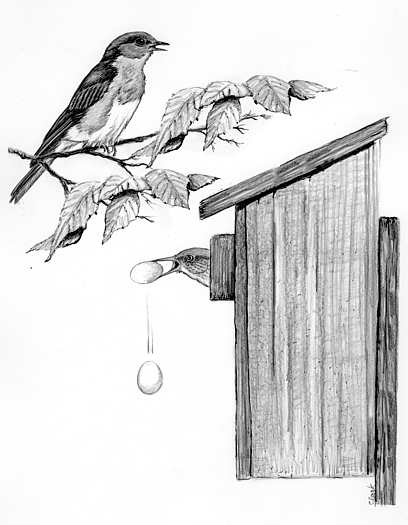
Dear Bird Folks:
A pair of bluebirds decided to move into one of my birdhouses. Everything seemed to be going fine until one day I found five bluebird eggs smashed on the ground beneath the house. I cleaned out the box and immediately the bluebirds returned and started another nest. But once again it ended with broken eggs on the ground. The chickadee nest in a nearby box was untouched. What could have destroyed those bluebird eggs? Could it have been the chickadees?
-Kimberly, Sandwich
DonÕt you dare Kimberly,
Don’t you dare try to blame the chickadees for this nasty egg attack. Chickadees are the best birds ever. They would never do anything like that. Just look at that sweet little chickadee face and tell me how you could even think that they would be involved in such a thing. If anything, the ever-helpful chickadees probably tried to put the broken eggs back together. But as we have all learned from the sad adventures of a certain H. Dumpty, egg reassembly is no easy task, even for chickadees. So if it wasn’t the chickadees, who could have done this awful thing? Let’s examine the evidence.
Being a vegetarian I have never tried one, but I would be willing to bet that baby bluebirds taste delicious. Just about everything wants to eat them, no matter how many carbs they have. Birds, mammals and even reptiles have baby bluebirds high on their list of favorite takeout foods. You are not the only one Kimberly to have a family of bluebirds attacked under mysterious circumstances. Most of the time the attacks occur without a credible witness, so we are left guessing. Here is the list of the usual suspects and their typical MOs.
If you find a bluebird’s nest with much of the nesting material pulled out of the hole, you can bet that the culprit was either a raccoon or my old nemesis, the uncontrolled house cat. Both of these creatures have long arms and agile claws for pulling eggs or baby birds out their nesting cavity.
If you find the eggs or newly born chicks missing, but the nest untouched, you could have had a visit from (this will freak you out) a snake. It creeps me out to picture a snake climbing a pole, but they can do it. They then stick their snakey little head into the nest hole and swallow everything they find. I know of people who have opened their nest box hoping to see baby birds only to find a curled up snake inside. I’m sure glad that wasn’t me opening the box or I would have easily broken every land speed record.
The major avian threat to bluebirds is the imported House Sparrow. House Sparrows are actually smaller than bluebirds but are much more aggressive. They don’t eat bluebirds but have no problem killing them. If a House Sparrow decides it wants to take over an occupied bluebird nest it will simply enter a box, kill the female while she sits on her eggs and build her own nest right on top of the dead bluebird family. Sweet eh? House Sparrows used to be called “English Sparrows,” but even the Brits wanted to distance themselves from this bird.
So far we have talked about bluebirds being eaten or killed, but we have not addressed what creature is likely to toss out the bluebird’s eggs but not eat them. Although I can’t say for certain I would guess the villain here is one of America’s favorite birds, the House Wren. Yes, our pal Jenny Wren has a dark side, a real dark side. Unlike the above creatures that eat bluebirds for their own survival, House Wrens destroy bluebird eggs for no reason, except to be control freaks.
House Wrens are fiercely territorial. They will try to control every nesting cavity within their territory. If they find another bird’s nest they will either break the eggs or toss the eggs out onto the ground.
Now before you start hating House Wrens Kimberly, keep in mind that in your area they are in the minority. Bluebirds are more common and their population is increasing. Still, if you want to keep both species happy, try putting out extra nest boxes. Also wrens like living close to buildings and shrubs. They may ignore bluebird boxes that are well out in the open.
You did the right thing by cleaning out the nest box that had been victimized. Cleaning out nest boxes encourages birds to re-nest. It’s also a good idea to open and inspect nest boxes regularly just to check for problems. However, if you ever hear a “hissing” sound coming from one of your boxes, you may want to ask someone else to open the box for you. Just don’t call me, unless you want to see me set a new land speed record.